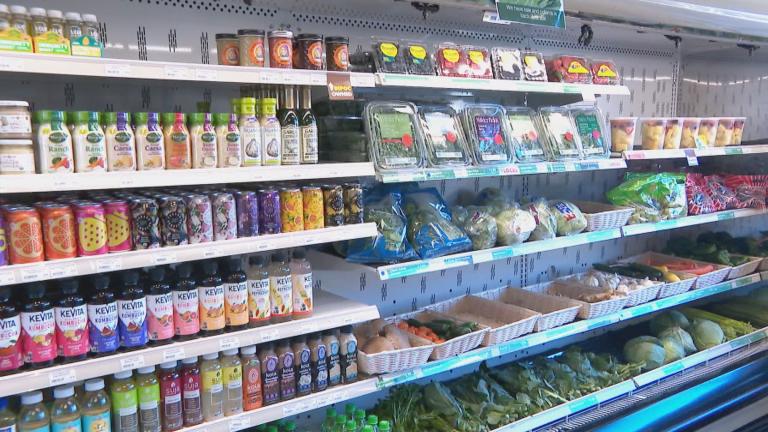In Illinois, farming is big business as one of America's leading producers of soybeans, corn and pork. The Illinois Farm Bureau estimates that Illinois's agricultural industry and related activity contribute more than $50 billion dollars to the state's economy. But the nature of farm work and the structure of our nation's migrant labor program make the people who perform long hours of labor in Illinois’ more than 72,000 farms vulnerable to abuse and the COVID-19 pandemic has only exacerbated an already alarming situation.
According to an analysis of data from the U. S. National Human Trafficking hotline by the Polaris Group, the last year has seen a more than 70% increase in reports of agricultural labor trafficking. Miguel Keberlein Gutierrez, executive director of the Legal Aid Society of Metropolitan Family Services, says from a legal perspective, what rises to the level of human trafficking versus labor abuse can be hard to pin down.
“There's a spectrum really along the lines of what is labor abuses that on the final end of it is labor trafficking,” Keberlein Gutierrez said. “It's truly when there's force, fraud, or coercion that keeps a person basically indentured to an employer in some way or fashion. And we see certainly a lot of it in the agricultural community.”
In November, the Legal Aid Society was given a $2 million grant to fund and expand the legal support they offer agriculture workers in Central and Northern Illinois.
Maggie Rivera, president and CEO of the Illinois Migrant Council, says it can similarly hard to pin down what might be a trafficking situation even when present at the farms.
“One way would be if we are talking to an individual and their answers seem to be rehearsed, or if they don't have any kind of eye contact and are not willing to talk to us by themselves,” said Rivera.
Rivera’s organization offers support and training to Illinois migrant farm workers. As part of their work, IMC also educates workers on their rights.
“When we start the season, normally we have had the opportunity to build some kind of rapport with growers and go into the farms and provide the trainings that we do,” said Rivera. “That's when we bring in also the information on their labor rights and work with other entities around the state that can also partner with us in bringing this information to them.”
IMC also trains its outreach workers to search for signs of abuse and trafficking.
“Signs of physical abuse or perhaps, poor living conditions or perhaps sometimes when we require that they provide us with some kind of documentation, they tell us they don't have that because their employer keeps that for them,” Rivera said. “Those kind of little signs would be the ones that we look for.”
Keberlein Gutierrez also says that the nature of farm work can make it difficult to find reliable statistics on how widespread the problem is.
“Because of the type of work and it's a migratory workforce and because of the changing markets and things, you don't always know even how many people are in the stream of migrant agricultural work,” Keberlein Gutierrez said. “So when it comes to trafficking, there are people who may be in situations where their traffic for a certain period of time, then they're no longer in that trafficking situation, then they reenter. But we do know that within the agricultural community, there's a high percentage of people who when asked about situations have identified some situation that would lead to trafficking.”
Keberlein Gutierrez points to labor recruitment companies as one way larger agricultural conglomerates can mask trafficking.
“They bring in a large labor force with a recruiter or recruitment company and that recruitment company has quite a bit of leverage into what promises they're making people and how they induce them into the work,” said Keberlein. “We find that people have been told ‘you're going to make so much money if you come here and do this’ and then when they get here, they might be given a certain amount of money, but they're held in a situation where they can't freely or believe that they can freely leave because of the debt that's owed to the recruiter.”
He also says the H2A visa program has deep flaws that leave workers vulnerable to trafficking.
“They offer these work visas to folks in different countries and the recruiter to go there. So the recruiter at the front end is promising certain things and oftentimes without anyone knowing they are basically bribing people for those jobs,” Keberlein says. “A lot of people are paying up front for the visas and that money is held against them while they're doing the work and when they arrive here, they may not even know where they are sort of geographically, they’re very isolated, they don't have access to resources or community agencies and a lot of employers prohibit [community organizations] from trying to reach workers and share information with them.”
But, Keberlein Gutierrez says, simply offering information at the beginning of the process to workers applying for visas could make a big difference in what they can expect from their U.S. employers.
“When workers are going through the consular process to get the visa, they are not given the information about where they're going and who they can reach out to if there's a problem,” Keberlein Gutierrez says. “And that I think would certainly alleviate a lot of issues of isolation and who they can speak to if they feel they're in a danger.”








